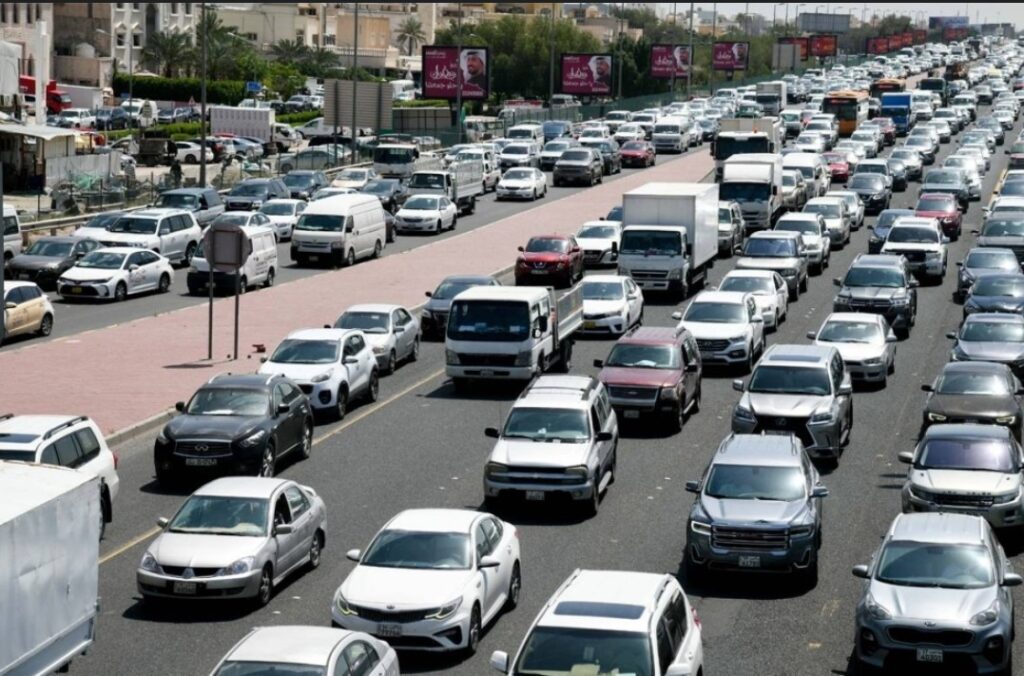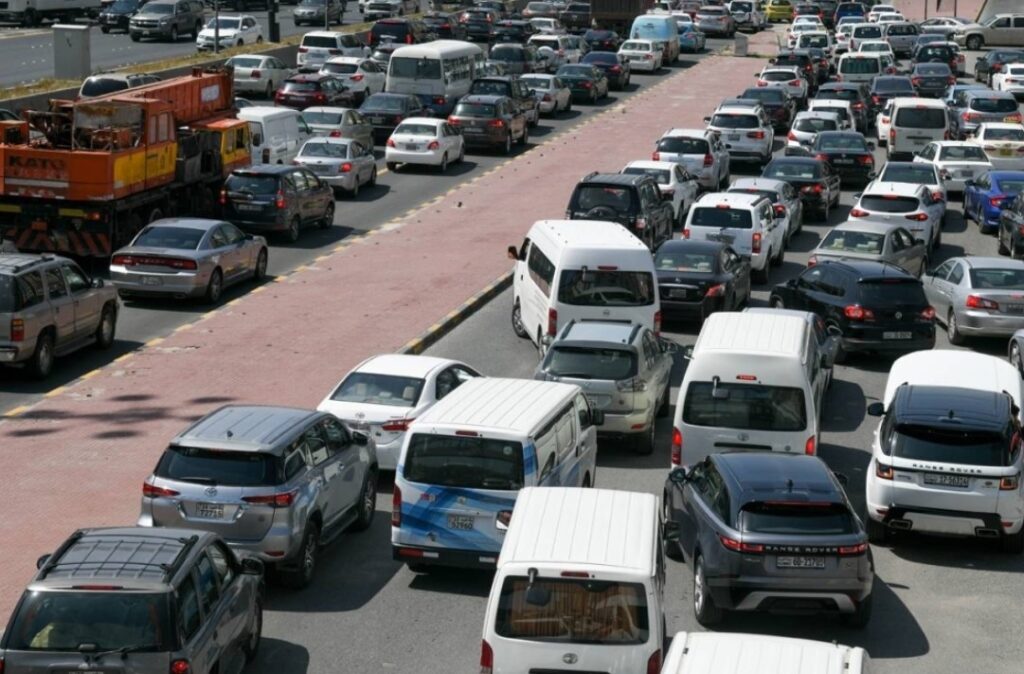15/04/2023
15/04/2023
KUWAIT CITY, April 15: At a time when the chronic traffic crisis is still stagnating for years without a radical remedy, the government continues to offer improvised solutions and harmful temporary sedatives by adding a lane here or there on the roads or creating a “flexible working time” system. These are useless solutions with a worn-out reality and a deteriorating infrastructure that paralyzes during the peak hours of a normal day, reports Aljarida daily.

This was highlighted in an opinion poll of some experts, who confirmed that a real breakthrough for this crisis could occur within four or five years, with a technical study prior to implementation.
Head of the technical office at the General Traffic Department Colonel Haqouqi Khaled Al-Adwani said the keys to resolving the crisis include developing roads, amending laws, and enhancing the traffic culture in society, in addition to rapid legislative intervention.
Furthermore, the founder of the "Kuwait Comet" initiative Jassim Al-Awadhi affirmed that the traffic congestion is due to "our reliance on individual means of transportation, as more than 80 percent of the traffic structure in Kuwait is for individual vehicles".
He said, "We need public transportation immediately, instead of paying for additional lanes.”
In turn, a member of the Municipal Council Engineer Alia Al-Farsi said she believes “our problem is overcrowding in the urban area.”
She stressed the need for new cities to be integrated and available with all services, which will lead to a reduction in the rate of congestion and overcrowding.

Eng. Al-Farsi also attributed the defect in the traffic congestion crisis to the lack of a central authority to enact legislation and develop strategies and policies for the public transportation system in Kuwait.
She said, "One of the biggest problems of traffic congestion is our total dependence on the use of individual vehicles, and our lack of dependence on mass and public transportation, in addition to the deterioration of infrastructure, transportation and road network.
If we talk about the infrastructure, I mean potholes, bus stops and sidewalks, the infrastructure must be developed, and efficiency enhanced. Also among the reasons that directly affect traffic congestion is the lack of respect by some motorists for traffic laws and their misconduct.
From my point of view, the solution to traffic congestion involves the existence of a comprehensive centralization, whether a body, an organization or a council responsible for setting legislation, policies and plans and managing the transportation system in an integrated manner.
It is also necessary to speed up the maintenance of the infrastructure and the road network periodically, as it is one of the basic solutions to raise the efficiency of public transport, urge the use of public and group transport, and develop a strategy to educate the citizen and resident on the benefits of using public and collective transport. Here I do not mean only buses. Even cars can be a means of mass transportation if legislation is put in place to regulate the issue, as a car can carry from 2 to 4 passengers. This will play a great role in reducing crowding, and will allow young people to create projects and applications that organize this process."
Regarding flexible work hours, Eng. Al-Farsi said, "It is a very small part of the solutions, but it was applied incorrectly. What is used here is the overlapping hours, meaning that there is a group of people whose time of departure is now, and another group that left a little earlier than them. This means that the two groups will meet on the street. This is not a solution to the traffic problem.
Flexible working hours could be in the form of one to four days a week, in which the employee is allowed to work online from home, provided there is a mechanism to work from home and maintain productivity."
Meanwhile, the former head of the Department of Civil Engineering and Administrative Systems at the College of Engineering and Petroleum in Kuwait University Dr. Fahad Al-Rukaibi said, "Congestion has become a part of our daily lives.
If the average time it took previously for an individual to reach his destination was 30 to 35 minutes, it is now about 50 minutes.
Our main common solution known by the state authorities and ministries is the expansion of roads, but this is not always the best or most appropriate solution. It is possible to widen the road and increase congestion at the same time.
The solution is not to use more land and widen the roads, Solutions that are proposed such as putting a tax on those who own more than one car, or imposing fees on those who enter Kuwait City, are illogical.
You must first look at the solutions on the contrary. What are the solutions that you have set and for which you want to get fees? Did you provide suitable metro, trains, buses and shared car services? And will other services get fees?
In Kuwait University, our role is supposed to be an advisory arm for the country. This is a system in force in all countries of the world, but some decisions that are issued are made without study. It is not reasonable to decide something and wait by experience to see people’s reaction to it. Study, and then make a decision based on this study."
Regarding flexible working hours, Dr. Al-Rukaibi stated that it was set in three periods, with half an hour break between each of them.
He asked, "Why did you not make the break between them 45 minutes or an hour? Why not less or more?
We did not find a clear answer because there is no study regarding this decision. We have seen what happened since the beginning of Ramadan in terms of traffic jams after the implementation of flexible working hours.
It is possible that the flexible working hours will continue until after Ramadan. We do not know what may happen at that time, so we are waiting to see the mistakes. We will then amend what may need to be amended. I do not prefer this situation, as I prefer prior study and identification, and then implementation with a little margin of error.”
Dr. Al-Rukaibi stressed that, "The solution to the congestion problem is easy but in denial, such as providing other options for people instead of cars. It is not reasonable that a trip you need to go to must require a car. To solve the congestion crisis in the long run, we must provide mass transportation in the right way. For instance, public transportation does not pass through all private residential areas.
I wonder who is responsible for mass transportation in Kuwait, and what oversight does it have? As for me, I do not know whom and I do not have an answer to that question.
If we reduce the use of the car in Kuwait by only 10 percent, we will see the impact of this on Kuwait. We can save fuel and time, reduce tension between people, and reduce road consumption, noise and pollution. We also need a metro, which will help a lot in reducing congestion rates.
We, as university professors, diagnose the problem and put studies and solutions to develop mass transportation or roads, but we do not have the power to force the authorities to implement the studies and solutions that we have presented and put forward."
In addition, the former assistant undersecretary for Traffic Affairs at the Ministry of Interior retired Lieutenant General Fahad Al-Shuwaya called for the formation of a higher committee for this problem.
He said, “There is no country in the world that stops issuing driving licenses and withdrawing licenses from expatriates, as this is definitely not a solution.
From 1980, we started constructing the Fifth Ring, Fourth Ring, King Fahad, Riyadh, King Faisal, and Al-Ghazali roads, but we overlooked an important thing, which is the establishment of the mass transportation system.
These roads that we have established should serve us for hundreds of years. It is not true that after 20 or 30 years, the entire infrastructure changes, an example of which is the Fifth Ring Road. We modified it three times - first Al-Khattabi Road, then Abu Al-Qasim Road, and we canceled the intersections, and the third is currently opposite South Surra, and Al-Surra, and this is considered a disaster.
I do not blame the Ministry of Public Works, but it is not permissible, after 20 years, to uproot South Surra from its roots, and demolish the infrastructure that was built and for which large sums of money were paid. It was supposed to be built from the ground up properly, taking into account all the changes that have taken place without the need for resorting to amending it.
There is no solution except by providing a system for mass transportation, because it greatly reduces traffic congestion. Today, when mass transportation is provided to the expatriates, they will not need a license or a car. When we travel to European countries, we do not use the taxi, as we use mass transportation."


